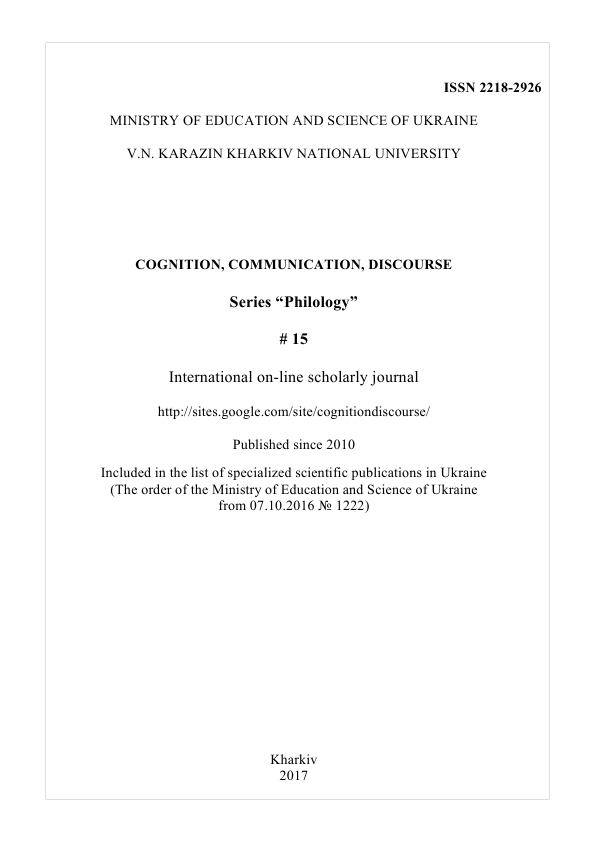Conceptualization of HAPPINESS by young native speakers of Kazakh
Abstract
The present study analyses the way HAPPINESS is contextualized by young native speakers of the Kazakh language who were asked to write an essay on “What is happiness?” The object of the research is definitions given to ‘happiness’ by participants of the experiment in their essays. The analysis showed that the basic criteria of HAPPINESS are related to participants’ families and their close environment. The analysis also revealed that conceptualization of HAPPINESS by respondents is constructed on the basis of conceptual metaphors, conceptual metonymies, and related concepts. As a result, prototypical cognitive models have been derived as “happiness is being glad” and “happiness is making glad”.
Downloads
References
Francis, W.S. (2005). Bilingual semantic and conceptual representation. In: J.F. Kroll & A.M.B. De Groot (Eds.). Handbook of Bilingualism: Psycholinguistic Approaches (pp. 251–267). New York, NY: Oxford University Press.
Gruber, J., Mauss, I.B., & Tamir, M. (2011). A dark side of happiness? How, when, and why happiness is not always good. Perspectives on Psychological Science, 6(3), 222–233.
Hofstede, G. (1984). Culture’s consequences: International differences in work-related values. Beverly Hills: SAGE Publications.
Kajdar, A. (2009). Kazaktar ana tili aleminde (etnolingvistikalyk sözdik [The Kazakhs in the world of their mother tongue (ethnolinguistical dictionary)] (Vol.1). Almaty: Dyke-Press.
Kecskes, I. (2007). Synergic concepts in the bilingual mind. In: I. Kecskes & L. Albertazzi (Eds.). Cognitive Aspects of Bilingualism (pp. 29–61). Dordrecht, the Netherlands: Springer.
Kövecses, Z. (1991). Happiness: A definitional effort. Metaphor and Symbolic Activity, 6(1), 29–46.
Kövecses, Z. (2008). The conceptual structure of happiness and pain. In: Ch. Lascaratou, A. Despotopoulou, & E. Ifantidou (Eds.). Reconstructing Pain and Joy: Linguistic, Literary, and Cultural Perspectives (pp. 17–34). Newcastle, UK: Cambridge Scholars Publishing.
Libben, G. (2008). Words, mind, and brain. In: P. van Sterkenburg (Ed.). Unity and Diversity of Languages (pp. 111–121). Amsterdam/ Philadelphia: John Benjamins Publishing House Company.
Lyubomirsky, S., King, L., & Diener, E. (2005). The benefits of frequent positive affect: Does happiness lead to success? Psychological Bulletin, 131(6), 803–855.
McMahon, D.M. (2006). Happiness: A history. New York, NY: Atlantic Monthly Press.
Oishi, Sh., Graham, J., Kesebir, S., & Galinha, I.C. (2013). Concepts of happiness across time and cultures. Personality and Social Psychology Bulletin, XX(X), 1–19. DOI: 10.1177/0146167213480042.
Pimenova, M.V. (2012). Yazykovaya kartina mira [Linguistic Worldview]. Moscow: Flinta/Nauka Publ.
Schnelle, H. (2010). Language in the Brain. Cambridge: Cambridge University Press.
Vorkachev, S.G. (2001). Koncept schast’ya: ponyatijnyj i obraznyj komponenty [The concept of happiness: notion and image components]. Izvestiya RAN. Seriya Literatury i Yazyka. – RAS News. Literature and Language Series, 60(6), 47–58.
Vorkachev, S. (2004). Schast’e kak lingvokulturnyj koncept [Happiness as a linguistic-cultural concept]. Moscow: Gnozis Publ.
Uchuda, Yu., & Ogihara, Yu. (2012). Personal and interpersonal construal of happiness: A cultural psychological perspective. International Journal of Wellbeing, 2(4), 354–369.
Zurif, E.B., & Blumstein, Sh.E. (1978). Language and the Brain. In: M. Halle, J. Bresnan, & G. Miller (Eds.). Linguistic Theory and Psychological Reality (pp. 229–245). Cambridge, et al.: The MIT Press.
Authors, who publish with this journal, accept the following conditions:
The authors reserve the copyright of their work and transfer to the journal the right of the first publication of this work under the terms of the Creative Commons Attribution License (CC BY), which allows other persons to freely distribute a published work with mandatory reference to the authors of the original work and the first publication of the work in this journal.
Authors have the right to enter into separate additional agreements for the non-exclusive dissemination of the work in the form in which it was published by this journal (for example, to post the work in the electronic institutions' repository or to publish as part of a monograph), provided that the link to the first publication of the work in this journal is given.
The journal policy allows and encourages the authors to place the manuscripts on the Internet (for example, in the institutions' repositories or on personal websites), both before the presentation of this manuscript to the editorial board and during review procedure, as it contributes to the creation of productive scientific discussion and positively affects the efficiency and dynamics of citing the published work (see The Effect of Open Access).




